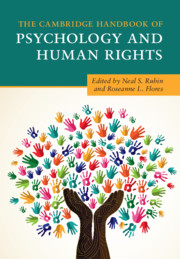Book contents
- The Cambridge Handbook of Psychology and Human Rights
- The Cambridge Handbook of Psychology and Human Rights
- Copyright page
- Dedication
- Contents
- Figures
- Tables
- Boxes
- Contributors
- Acknowledgments
- The Core International Human Rights Instruments and Their Monitoring Bodies
- Universal Human Rights Instruments
- Sustainable Development Goals
- Glossary of United Nations and Psychology Acronyms in the Handbook
- Introduction
- Part I History of Human Rights
- Part II The Intersection of Psychology and Human Rights
- Part III Contemporary Issues in Psychology and Human Rights
- 12 Mental Health and Human Rights
- 13 Cultivating Our Common Humanity
- 14 From Refugees to Immigrants
- 15 UN Convention on the Rights of the Child and the Sustainable Development Goals
- 16 The Global Contributions of Psychology to Understanding and Addressing the Non-negotiability of Human Dignity and Health Equity
- 17 Human Rights and Psychology from Indigenous Perspectives
- 18 Human Trafficking
- 19 Human Rights Seen through a Cultural Lens
- 20 Human Rights and Well-Being of Older Persons
- 21 Reproductive Justice, Psychology, and Human Rights
- 22 Psychology and the Global Human Rights Agenda on Sexual Orientation and Gender Identity
- 23 Psychosocial Features of Movements That Have Advanced Human Rights
- 24 Principles of Care of Survivors of Organized Violence in a Global Society
- 25 Mental Health and Psychosocial Support in Humanitarian Settings
- 26 Children and Violence across the Life Span
- 27 Psychology and Human Rights in the Age of Genomics and Neuroscience
- 28 Behavioral Insights, Public Policy, and Human Rights
- 29 From Human Resources to Human Rights
- 30 Climate Change
- Part IV Teaching, Research, and Training in Psychology and Human Rights
- Part V Future Directions
- Index
- References
29 - From Human Resources to Human Rights
Tools for Humanitarian Work Psychology
from Part III - Contemporary Issues in Psychology and Human Rights
Published online by Cambridge University Press: 02 October 2020
- The Cambridge Handbook of Psychology and Human Rights
- The Cambridge Handbook of Psychology and Human Rights
- Copyright page
- Dedication
- Contents
- Figures
- Tables
- Boxes
- Contributors
- Acknowledgments
- The Core International Human Rights Instruments and Their Monitoring Bodies
- Universal Human Rights Instruments
- Sustainable Development Goals
- Glossary of United Nations and Psychology Acronyms in the Handbook
- Introduction
- Part I History of Human Rights
- Part II The Intersection of Psychology and Human Rights
- Part III Contemporary Issues in Psychology and Human Rights
- 12 Mental Health and Human Rights
- 13 Cultivating Our Common Humanity
- 14 From Refugees to Immigrants
- 15 UN Convention on the Rights of the Child and the Sustainable Development Goals
- 16 The Global Contributions of Psychology to Understanding and Addressing the Non-negotiability of Human Dignity and Health Equity
- 17 Human Rights and Psychology from Indigenous Perspectives
- 18 Human Trafficking
- 19 Human Rights Seen through a Cultural Lens
- 20 Human Rights and Well-Being of Older Persons
- 21 Reproductive Justice, Psychology, and Human Rights
- 22 Psychology and the Global Human Rights Agenda on Sexual Orientation and Gender Identity
- 23 Psychosocial Features of Movements That Have Advanced Human Rights
- 24 Principles of Care of Survivors of Organized Violence in a Global Society
- 25 Mental Health and Psychosocial Support in Humanitarian Settings
- 26 Children and Violence across the Life Span
- 27 Psychology and Human Rights in the Age of Genomics and Neuroscience
- 28 Behavioral Insights, Public Policy, and Human Rights
- 29 From Human Resources to Human Rights
- 30 Climate Change
- Part IV Teaching, Research, and Training in Psychology and Human Rights
- Part V Future Directions
- Index
- References
Summary
Despite the Universal Declaration of Human Rights, a majority of the world’s working population does not enjoy access to decent work and a sustainable livelihood. Humanitarian work psychology focuses on this issue, which resonates with the UN Sustainable Development Goal (SDG) of decent work and shared prosperity for all. The chapter outlines a series of human rights structures that should, as a matter of course, be incorporated into work psychology teaching, research, and service – including workplace consultancy. Their incorporation contributes to the International Labour Organization’s Decent Work Agenda under SDG8, as well as to the remaining sixteen SDGs, including SDG17, Partnership. We outline the nature and ethos of key human rights structures at work. These include UN charters such as the UN Development Programme and the Global Compact; the Organisation for Economic Co-operation and Development (OECD) Guidelines for MNEs [multinational enterprises] and the Living Wage; and finally, a series of New Diplomacies (CSEND, 2012) for utilizing these structures to help bring workplace policies into line with the SDGs in general and SDG8 in particular. In so doing, we show that human rights are not at the periphery of good business and decent sustainable organizations; rather, they are their heart. Human rights are a nucleus for making work more humanitarian and livelihoods more sustainable.
- Type
- Chapter
- Information
- The Cambridge Handbook of Psychology and Human Rights , pp. 428 - 442Publisher: Cambridge University PressPrint publication year: 2020
References
- 6
- Cited by

